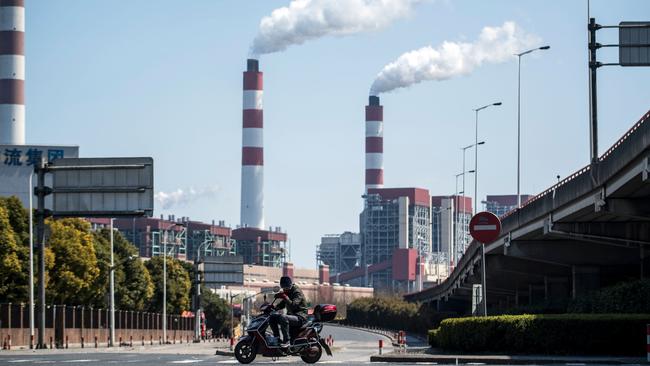At UN, China’s Xi commits to stop building coal plants abroad
China’s pledge to stop building coal-fired power plants abroad is a move to redirect its engineering industry away from adding to global pollution.

Chinese President Xi Jinping said Beijing would stop building coal-fired power plants abroad, in a public commitment to redirect the country’s huge engineering industry away from adding to a source of global pollution.
Beijing has faced pressure from the US, the European Union and environmental groups for having continued to finance and build coal-fired power plants in many developing countries, even as it said it would cut greenhouse emissions at home.
“We need to accelerate a transition to a green and low-carbon economy,” Mr Xi said in a taped speech for the United Nations General Assembly. “We will make every effort to meet these goals. China will step up support for other developing countries in developing green and low-carbon energy, and will not build new coal-fired power projects abroad.”
Coal is central to China’s energy mix, and it is the world’s biggest producer and consumer of the resource.
China already had appeared to pull back from some power-plant construction deals overseas since Mr Xi made climate pledges at last year’s UN meeting, and some lower-level government officials have suggested Beijing was cooling toward the coal sector.
In his UN address, Mr Xi reiterated his commitments that China will cap its own carbon emissions by 2030 and achieve carbon neutrality by 2060. “This requires tremendous hard work,” he said. Though China has continued to commission coal plants at home at a faster pace than any nation, Mr Xi told a conference convened by President Joe Biden in April that China would begin cutting its coal consumption after 2026.
China didn’t provide financing or investments in any coal projects in the first half of 2021 under Mr Xi’s Belt and Road infrastructure initiative, according to a study by the Beijing-based International Institute of Green Finance published last week. More than half of the $160 billion in coal-fired plants that China announced as part of Belt and Road since 2014 have been cancelled or shelved, another study by the institute found in June.
Addressing carbon emissions is a theme at this year’s General Assembly ahead of a UN climate summit planned for November in the Scottish city of Glasgow. In his address earlier in the day, Mr Biden said the US would provide more support for countries that can’t afford to make the transition toward greener energy sources and said that with U.S. support, private capital and money from other countries there should be some $100 billion to support climate action in developing nations.
Mr. Xi mentioned his pledge to stop building overseas coal-fired plants in a single sentence that didn’t say when the moratorium would take place nor whether it will affect plants already on the drawing board. As part of Mr Xi’s global infrastructure-construction push, China’s major engineering companies build power plants in deals co-ordinated by Beijing that are tightly intertwined with financing from the country’s big banks. Mr Xi didn’t mention funding aspects of the industry.
“Lack of timetable aside, it’s incredibly significant,” Greig Aitken, a Czech Republic-based researcher at a US think tank, Global Energy Monitor. He said Mr. Xi’s statement illustrated a top-level commitment and will from China.
In an email, David Sandalow, a Columbia University researcher and former senior official at the U.S. Department of Energy, said, “Details matter. In particular, what happens to projects already in the pipeline? But this is a significant and very positive announcement.”
The South Korean and Japanese governments have made similar pledges to stop building coal-fired plants in developing countries, as have many big commercial banks and the key multilateral institutions where the U.S. holds sway. Still, Mr. Aitken said financing for coal plants was sometimes available from bonds arranged by Wall Street banks.
China appeared reluctant to engage with Mr. Biden’s climate envoy John Kerry on the subject of coal-fired plants during his recent visit to see his Chinese counterparts. Mr. Kerry was told that Washington shouldn’t expect co-operation from Beijing on climate without better relations in other areas.
In the past, Mr. Xi has said China aims for non-fossil-fuel sources to reach 25 per cent of its energy use by 2030, compared with 20 per cent in a 2016 target. He also has said China would cut carbon-dioxide emissions per-unit of gross domestic product by over 65 per cent from the 2005 level, increase forest stock volume by 6 billion cubic meters and bring China’s total installed capacity of wind and solar to 1,200 gigawatts.
Ultimately, the commitment is in line with what Mr. Kerry has been asking for.
“I’m absolutely delighted,” Mr. Kerry said to reporters outside of U.N. headquarters. “It’s a good beginning to the efforts we need to achieve success in Glasgow.”
The Wall Street Journal



To join the conversation, please log in. Don't have an account? Register
Join the conversation, you are commenting as Logout